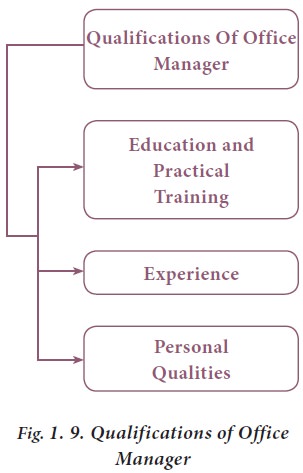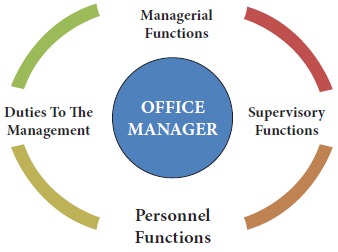Modern Office | Management and Secretaryship - Office Manager | 11th Office Management and Secretaryship : Chapter 1 : Modern Office and Functions
Chapter: 11th Office Management and Secretaryship : Chapter 1 : Modern Office and Functions
Office Manager
Office
Manager:
An
office manager is an individual, who is incharge of an office and whose
function is to organize and control the activities of the office. He is
appointed to head the office. “The office manager is the pivot around which the
office function revolves” (Denyer, J.C.).
He
extracts the work from the subordinates to achieve organizational goals. It is
his responsibility to plan, organize and control the clerical aspects of the
organization including the preparation, communication, coordination and storage
of data to support production and other important operations of industrial
establishments. He monitors the work processes and evaluates their outcome. On
the whole he is appointed as an administrative head of office.
Some
of the functional names associated with an office manager are Manager,
Administrative Manager, Commercial Manager, etc.
Today,
in the modern era of dynamic and competitive business environment, the office
manager has to perform a wide variety of tasks from managing basic office
services to handling of the most modern techniques of systems integration,
automation, operations research and communication. In performing these tasks he
assumes the position of a full-fledged functional executive at par with other
operational executives.
1. Qualifications of Office Manager:
The
qualifications of a successful office manager are grouped under the following
three heads (i) Education and Practical training, (ii) Experience and (iii)
Personal qualities.

Education and
Practical training: An office manager must have
appropriate educational qualifications. He should possess not only bachelor’s
degree in the relevant discipline, but also have proficiency in English and one
or more foreign languages. The office manager must also have special training
in business administration, accounting, office systems and procedures, office
machines and data processing methods.
Experience: He should have
sufficient business experience preferably be in a similar
organization as the one employing him as office manager. This will enable the
office manager to get familiar with the routine procedures of the organization
and also the problems of the office that he has to manage.
Personal Qualities:
The main task of the office manager is to get the office work done by personnel
of the office efficiently and economically. To achieve this objective he must
be able to organize, inspire and lead the staff under him. He must also try to
understand the ability and aptitude of each individual worker and delegate work
to them accordingly. For this he must possess a number of personal qualities
such as leadership, sound judgment, sense of justice and fair play,
impartiality, sincerity, understanding of human nature, tact, persuasiveness
etc.
2. Functions and Duties of Office Manager:
The
scope of office manager’s work is very wide. It differs from business to
business and organization to organization and from office to office. No two
office manager performs same set of functions. However, philosophers and
researchers have classified the functions of office manager as below.
1.
Managerial
Functions
2.
Supervisory
Functions
3.
Personnel
Functions
4.
Duties
to the Management.

1. Managerial Functions: The office manager is the administrative head of office. It is his duty to
manage the entire affairs of an office. As an administrative incharge, he is
expected to perform the following functions.
·
Planning
the work to be performed before hand.
·
Forecasting
the future demands based on past records.
·
Organising
the activities of office.
·
Co-ordinating
the activities of various departments.
·
Executing
the policies and programmes of the management.
·
Communicating
various policy decisions to the functional managers.
·
Designing
and implementing new systems and procedures.
·
Reviewing
system and procedures periodically and effecting changes in them.
2. Supervisory Functions: The prime duty of office manager is to extract the work from subordinates.
In this regard, he performs the following supervisory functions:
·
Dividing
and allocating the work among the subordinates based on their specialisations.
·
Ensuring
that the work is carried out as per predetermined schedule.
·
Exercising
regular control over the quantity and quality of the work done by the
subordinates.
·
Ensuring
the punctuality.
·
Providing
adequate stationery and supplies and controlling their usage.
·
Arranging
for appropriate equipment and maintaining them in proper working conditions.
·
Maintain
the office, well organised, clean and tidy.
3.
Personnel Functions: At
times office manager acts as a human
relation officer for his own department. To ensure higher degree of accuracy
and efficiency at work he should have efficient subordinates. For that purpose
he discharges the following duties.
·
Recruit
or hire skilled workers for the departments.
·
Arranging
for training and
·
Development
programmes for
·
the
subordinates to upgrade their knowledge.
·
![]() Conducting staff appraisal interviews periodically.
Conducting staff appraisal interviews periodically.
·
Measuring
the work of subordinates through appropriate methods.
·
Fixing
up remuneration for the staffs and devising methods for suitable compensation.
·
Dealing
with matters as regards to indiscipline.
·
Counselling
and settling the disputes among the subordinates to the possible extent.
4. Duties to the Management: Office manager is a functional head of the department. He acts as staff
expert to top management and offers advices on various policy matters relating
to office routine. He also performs the functions like
· Provision of information that is
needed to make policy decisions.
·
Supporting
and implementing the policies of the top management.
·
Reporting
the problems to the management which are beyond his limits.
·
Identifying
problems in the implementation of the policies and reporting to the top
management for remedial action.
·
Handling
mails and fixing up appointments on behalf of top managers.
3. Qualities of Good Office Manager:
In
the recent years the authority and responsibilities of office manager have
grown substantially. They are more involved in policy decisions. The office
manager should be capable to face challenges of modern complexities of business
world. Dynamic office manager possess the following qualities.
Organising Ability: A modern office manager must be a good organiser. He should organize the office
services in such a way that it can be performed smoothly, efficiently and economically.
He has to act in the following manner:
1. Dynamic Leadership: He should be an energetic leader. He should inspire and build confidence in
the minds of the subordinates. He must also encourage the subordinates to
perform their job effectively and efficiently to achieve the common goals of an
organisation.
2. Innovative: He should be innovative. He should have creative thinking and
capability to develop better methods and systems. Moreover, he should always in
search of new and innovative methods and techniques of doing the office work in
order to increase the efficiency and quality of the work.
3. Ability to Delegate: Office manager should be competent to divide and allocate the job among the
subordinates according to their capabilities. Effective delegation of authority
ensures accountability among subordinates and indirectly boosts their moral to
a higher level.
![]()
4. Development of Personnel: He should be a demographic leader. He must encourage the subordinates
to carry on their routine work without his interventions and also allow them to
participate in the decisions relating to their work. He must conduct staff
appraisal periodically to identify their progress and accordingly arrange for
training and development programmes for their self-up gradation.
5. Forward Looking: The office manager should be forward looking. He should
be competent to forecast the future, visualize the future problems and devise
plan to avoid such problems. E.g. heavy competition, fall of demand, price
hikes etc.,
Related Topics